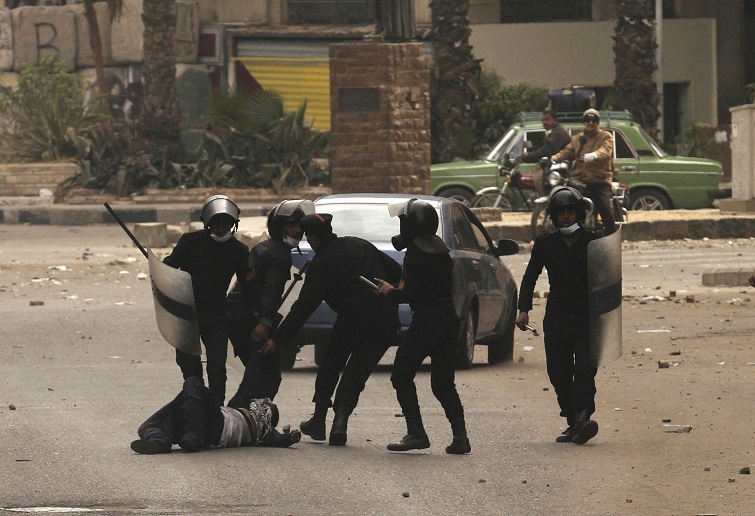
(AFP File Photo/ Mahmoud Khaled )
At least 50 detainees, mainly held under the controversial Protest Law, are expected to be released after a presidential pardon before 25 January, human rights lawyer Tarek El-Awady told Daily News Egypt Saturday.
The activists earned the support of local and international rights organisations over the past year.
El-Awady, who worked as part of political activist Ahmed Douma’s defence team in the ‘2011 cabinet protests’ case, said his client was going to be among the released prisoners.
However, there is still no news about 268 co-defendants accused in the same case.
Other names included American-Egyptian Mohamed Soltan, son of Muslim Brotherhood figure Salah Soltan, accused in the case known as the ‘Rabaa Al-Adaweya operations room trial’. Soltan and Douma have suffered from deteriorating health mainly caused by their hunger strikes in protest at their detention.
Soltan, who was arrested on 25 August 2013, has been on a hunger strike for 347 days according to a “Free Soltan” support group on Facebook. Douma’s detention period has exceeded a year, in addition to several prison sentences since December 2013, including a recent three-year sentence for contempt of court.
The pardon also reportedly include jailed activists from the ‘presidential palaces protests’. This includes activists Sanaa Seif and Yara Sallam alongside 20 others, whose sentences have been reduced from three to two years, according to a recent court decision on their appeal.
Mona Seif, whose sister Sanaa Seif and brother Alaa Abdel Fattah are detained in separate cases related to the protest law, posted on her Facebook account following the news. Seif said experience taught her not to “trust promises by authorities”.
“The worst part is discussing who would get out and who wouldn’t, maybe even in the same case. I hope my siblings are the last people to be released from prison because it is so hard to explain to the family of a detainee why authorities decided to overlook him and release his colleagues,” Seif wrote Thursday.
The lawyer and president of the Egyptian Organization for Human Rights (EOHR) and a member of the state-affiliated National Council for Human Rights (NCHR) reportedly told the press that a list with 200 names will be submitted to the presidency next Tuesday to demand pardoning them.
EOHR urged President Abdel Fattah Al-Sisi to “pardon the defendants and drop all charges on them based on their rights to freedom of expression and those rights are guaranteed by the constitution in articles 65 and 73”, in a statement released Tuesday, following the verdict in the ‘presidential palaces’ case.
The news on a presidential pardon came only a few days following a court decision to accept an appeal annulling prison sentences for Al Jazeera journalists, who face retrial.
EOHR renewed demands to amend the current Protest Law, “that jags the right of peaceful assembly that is guaranteed by international human rights treaties and conventions”. EOHR said that “this law pushes Egypt back to the [the pre-25 January Revolution period], and that the right of peaceful assembly has to be observed and respected.”
This comes as the NCHR repeatedly called on authorities to consider their suggestions for amendments to the law. The last call was made by the council on the UN’s Human Rights Day on 10 December.
The end of undetermined periods of temporary detention pending trials came on top of NCHR’s recommendations in changes to the Protest Law.
